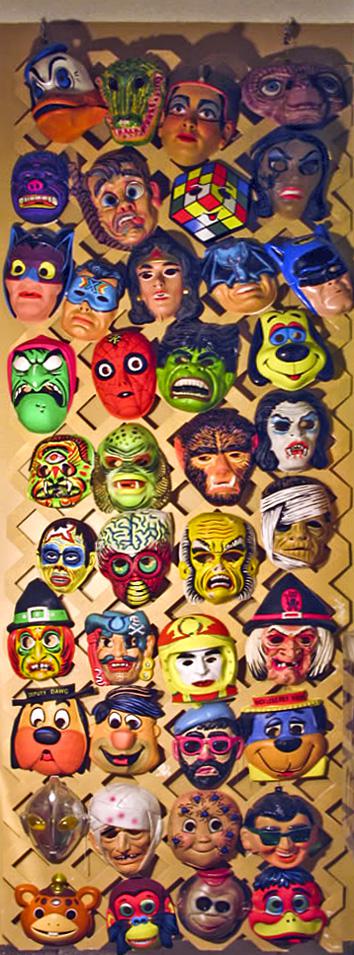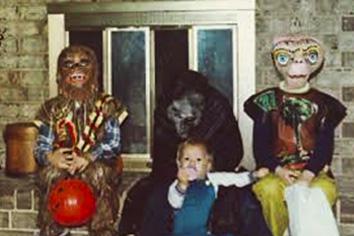When I was 7 years old, I was Chewbacca for Halloween.
The body of the costume was made out of a sheet of plastic, the kind that went “whoosh, whoosh” when you walked. It looked like a garbage bag. On it was a picture of Chewie’s head with “Star Wars” emblazoned above it, in case you didn’t recognize the Wookiee and what movie he was from. The mask—a thin, brittle piece of plastic—had two eyehole cutouts, two small nose-holes and a slight mouth slit for easy breathing. Only, it wasn’t easy to breathe when wearing that mask. And I had a hard time fitting it over my thick, plastic-framed glasses because the thin white elastic that held it in place would break every other time I put it on. And once I did, my glasses would steam up from the massive amount of sweat my body was producing from the costume. And don’t get me started about the lack of sleeves. Chewbacca didn’t have to wear a flannel shirt to keep his arms warm in cold weather. But I did.
I hated that costume. But it was a cheap and easy way for me to become my favorite Wookiee. It was a Ben Cooper.
Ben Cooper, the son of a restaurant owner who became a costume impresario, didn’t invent the Halloween costume. But he and his company awakened generations of kids to the potential of what Halloween could be. No longer were we limited to the question, “So, are you going to be a ghost, a goblin, or a witch?” The question became, “So, what are you going to be for Halloween?” Thanks in large part to Ben Cooper, costume choices became unlimited—and Hollywood-inflected—helping Halloween become the pop culture phenomenon it is today.
Ben Cooper wasn’t the first company to manufacture Halloween costumes, nor was it the first to license Hollywood creations for the costume-buying public. Collegeville Flag and Manufacturing Company, one of Ben Cooper’s chief competitors, had been doing it since the early 1920s, and H. Halpern Company, otherwise known as Halco, was manufacturing Popeye, Olive Oil and Wimpy costumes during the same period. But Ben Cooper had an advantage: The company excelled at getting licenses to characters before they became popular and, in a lot of cases, before anyone else. Consider one of its first purchases, in 1937: Snow White, from a little company called Walt Disney.
It wasn’t until after World War II, however, that Halloween costume manufacturing became big business. With the rise of television in the 1950s and the popularity of TV shows such as The Adventures of Superman, Zorro, and Davy Crockett, Ben Cooper obtained the licenses to many of these live-action shows and began mass producing inexpensive representations of them in costume form for less than $3 each, which amounts to about 12 bucks these days. The company distinguished itself with speed: It would rapidly buy rights, produce costumes and get them onto store shelves, which opened a whole new world of costuming to children.

Photo courtesy Devlin Thompson/Flickr via Creative Commons
By the 1960s, Ben Cooper owned between 70 and 80 percent of the Halloween costume market, offering pretty much any pop culture reference in costume form. There were Frankenstein costumes. Dennis the Menace costumes. Beatles costumes. Even Magilla Gorilla costumes.
Ben Cooper also found fodder in comic books. In 1963, Spider-Man was a relatively unknown character. The company had been selling a costume called “Spiderman” in the 1950s that had nothing to do with the comic book hero, but when Marvel Comics introduced Spidey in Amazing Fantasy No. 15 in 1962, it trademarked the name. Ben Cooper then licensed the Marvel character, remodeled its old costume and helped make Peter Parker’s superhero identity a household name. It was Marvel’s first merchandising deal.
In the 1970s and early ’80s, Ben Cooper sold costumes based on shows such as Joanie Loves Chachi, Welcome Back, Kotter, and Laverne &Shirley, which seems odd, since those shows weren’t targeted to kids. But it’s a clear example of the company’s mission to touch all aspects of pop culture. Nothing was off limits as far as costumes went. Not even the Fonz. Not even the Rubik’s Cube or Flipper. And remember those Richard Nixon masks long favored by cinematic bank robbers? Ben Cooper made those, too.
By 1979, Ben Cooper was the largest Halloween costume company in the United States, despite the rise of other businesses in the market. And though companies like Collegeville (still in business) won licenses to films like Jaws and The Golden Voyage of Sinbad, Ben Cooper won the most lucrative license of all: Star Wars. But controversy brewed among concerned parents when the company issued the first costume based on an R-rated movie, the creature from Alien.
Ben Cooper’s heyday didn’t last forever. The company filed for bankruptcy twice due to lagging sales, relocation expenses, and the early 1990s recession. But it was new rivals that probably did the most damage to Ben Cooper ’s business, selling high-quality latex masks and more realistic costumes. One of those competitors was Rubie’s Costume Company, which eventually bought Ben Cooper and dissolved it.
Ben Cooper’s business model of making cheap, affordable costumes quickly, based on almost any pop culture character a child could imagine, was wildly successful. But it also proved to be the company’s downfall. Quality eventually won over quantity. Looking back on those costumes now, it’s easy to see why; case in point, my old Chewbacca outfit. Still, if you Google “Miley Cyrus Halloween costume,” you’ll find plenty of options, ranging in price from $39.99 to $185. For that, we have Ben Cooper to thank.
My wife and I recently bought our 3-year-old son a Spider-Man costume. It has foamy, built-in muscles, a form-fitting suit and a mask that fits completely over his head. And it has sleeves. Sleeves! There’s no mistaking he’s Spider-Man. And to say he’s excited for Halloween is an understatement. Of course, it’s completely my fault. Halloween is my favorite holiday. And it always has been. No matter how much I hated that Chewbacca costume, I have happy memories of trick-or-treating because of it.
Correction, Oct. 31, 2013: This article originally misspelled Wookiee, the species of the Star Wars character Chewbacca.
